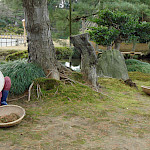6 Jun 2024
JETAA News
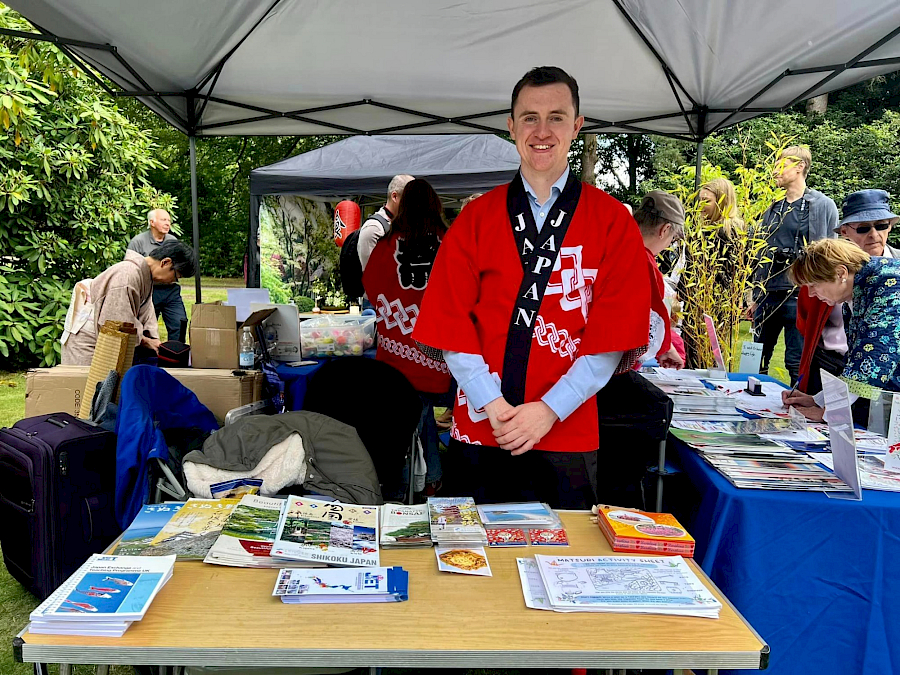
15th November 2023
JET Spotlight: Jonathan Longden
Jonathan Longden was a Shiga Prefecture JET in 2016 but is now a project management team leader in the pharmaceutical industry. He sat down to chat with us about his time in Japan and the transition back into that industry.
How did you become interested in the JET Programme, and where did you go?
Every time somebody asks me this question, I always start with Karate. I've done Karate since I was a little boy, since the age of 9. I've had a few little breaks, but from when I was a teenager onwards, I did it religiously 3-5 times a week. I was doing seminars around the country, and I was competing. So, it really was my life. My interest in karate led to an interest in everything else Japan-related, so I became interested in the language, culture, and food; it just became a bit of a dream to go and live in Japan.
I did a bachelor's degree in biochemistry at Lancaster University. As I was finishing my degree, I did a session on group interviews. I was trying to apply for a role in the NHS at the time, and I was sat in this big group session, and one of the people who was speaking was from Teach First. She briefly spoke about her experiences and mentioned that she had lived and worked in Japan, and then she spent the rest of her hour session speaking about teaching first with the goal of trying to get people enrolled. I went up to her at the end and didn't ask her anything about Teach First, I was just interested in what she had done in Japan. She told me she had been on JET and she had had an amazing experience, so I went home and googled the JET programme. I literally just found out about it by chance and then decided then and there that that is what I wanted to do.
At the same time I applied for a master's degree, also at Lancaster, something that I was quite interested in. So, I thought; I'll apply, if I don't get it, then I'll just go with my original plan or, you know, see what happens if I do get accepted. I did a master's degree in chemical engineering, multidisciplinary and spent a year doing that. I finished, and the dream of going to Japan never went away, so I picked up the JET Programme application where I've left off, and the rest is History.
I went in 2016, and I was there for around three years. On my application, I wanted to be somewhere around Tokyo. I just thought Tokyo was where it was at; I had never been before. A lot of my friends who did Karate, they wanted to go to Japan and train in Karate in Tokyo, so I thought I'll go around there, but I wont choose Tokyo as it'll be a bit over subscribed. So, I chose Yamanashi, Shizuoka and Ibaraki, and I went nowhere near Kanto and ended up in Shiga Prefecture on the west side of Japan. But I think whoever chose to put me there knew me better than I knew myself because it ended up being the perfect place for me and is now my favourite place in Japan, so yeah three happy years in Shiga prefecture.
I lived just north of Kyoto, so I was in the Southeast as well, so I could get to the station in 30 minutes. So, close, but also, it's very much out of the way. The thing people know about Shiga is it is home to Lake Biwa, the biggest lake in Japan.
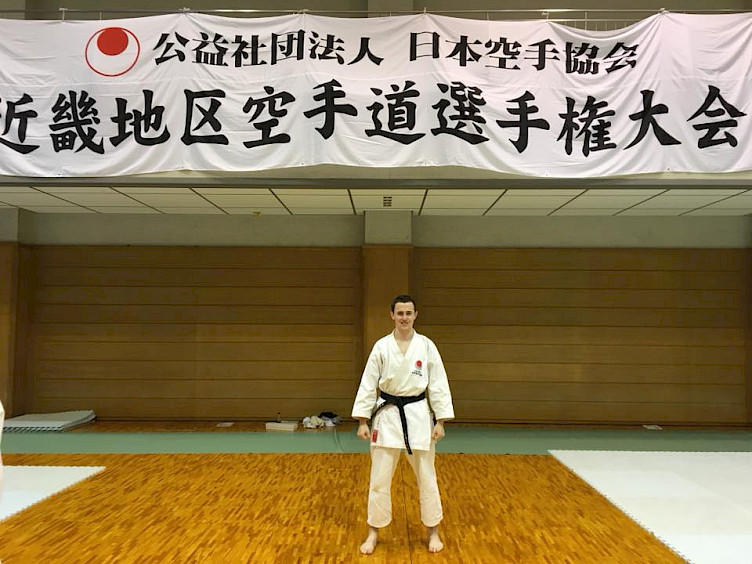
What are your best JET memories?
I'll choose three. I'm very outdoorsy, which is why Shiga was really good for me. It has mountains, and beautiful roads, Lake biwa is slap bang in the middle of the prefecture. On the west side there's a big mountain range called the Hira Mountains, and it really dominates the skyline in Shiga. I could see it from my house, it's huge, and it changes with the seasons. It's like hazy blue in the summer, and then obviously snow caps in the winter and becomes all orange and red in autumn. I tried to spend as much time as I could in those mountains, and I did lots of peaks individually. I think I tried to do a traverse from South to North of the Hira mountain range. It would take two days, and right in the middle, there's like this big open plain completely out of nowhere. It looks like it's a made campsite, but it's not it's just right in the middle of the mountains. We camp there, and then in the morning, we set our alarms really, really early, jumped to the nearest summit, and just looked down on Lake Biwa. We could see the sun rising behind it from the east side, and it was just stunning. Just us sat on a mountain chatting together. Seeing the sky go orange and red and blue and whatever and that's a really unforgettable memory. I've done Mount Fuji as well, but although the sunrise is amazing, you're kind of like a sardine with a million other people there, and it was just nice to enjoy that with two other people, so that was definitely one of my best memories.
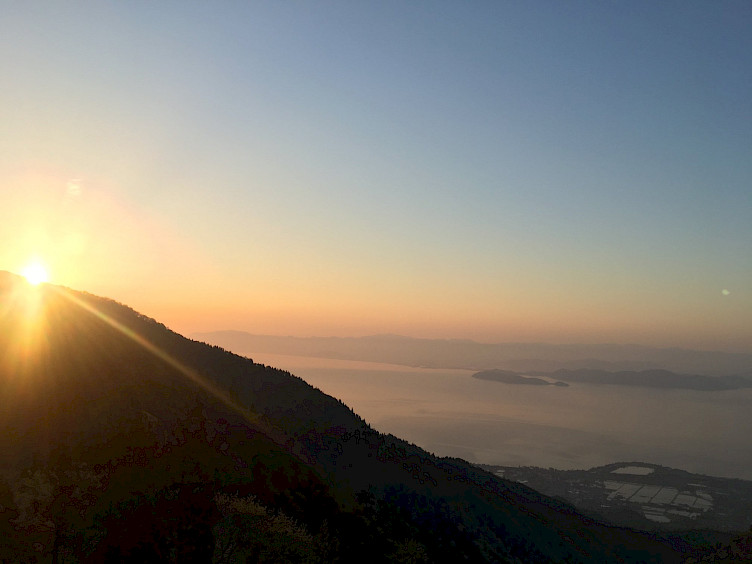
I also did a lot of cycling when I was in Japan. I actually sent my road bike from the UK to Japan and used it an awful lot whilst I was there. Probably the best ride I did was with my friend, who was also English. We did a ride from Moriyama, which is the city where I was in Shiga prefecture, and spent four days riding to Hiroshima, it's about 4-500 kilometers in total, I think. Shiga to Kobe, Kobe to Okayama, Okayama to Onamichi, Onamichi to Hiroshima city. It was a four-day ride, and we saw lots of stuff along the way, and when we got there from Shiga, two of our other friends just showed up, having taken the shinkansen down.
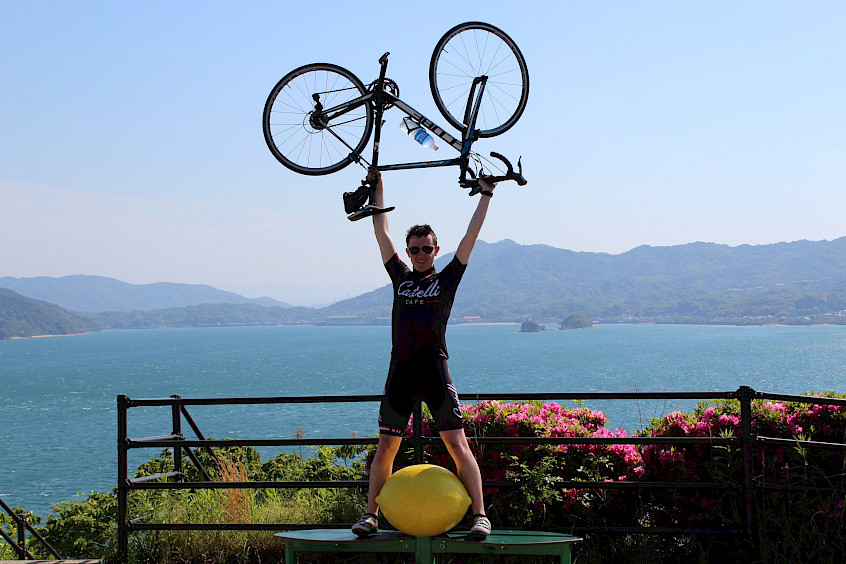
My third memory would be one of my actual classes. I think a lot of people talk about what they did in Japan outside of their job, but I loved my job, and I would probably choose my last class as they were very memorable. With my high school students, I gave them all an A2 sheet of paper and I said, "I'm leaving Japan, you're going to get a new ALT, and I would like you to make a guidebook to this high school." I was just blown away with how much effort they put into it. I was so artistic and so creative, and they were just expressing themselves in English to try and welcome this new teacher in English, which was really nice.
For the the last bit of the class, I gave them all a piece of paper and said, 'Right, I'm going to leave. You've known me for 3 years. You can ask me anything you want. Write the question on a piece of paper, and then I want you to throw it into a bucket at the front of the class. If you get it in, then I'll answer the question, and it can be anything.' They were so silly.
"How many girlfriends do you have? Please tell us in detail." detail was underlined.
"Can you speak English?" From someone who was clearly quite observant.
"I love you more than anyone. Will you marry me" that was from boy who was the class clown.
And "How is your eyesight?".
What Challenges did you face whilst on JET?
I was quite lucky because I have a great school and all the kids were really motivated to learn English, which was really nice. I was in a bit of a unique experience because, when I arrived, they only had one school, and it was a high school and junior high school. I got to teach the cute young students, then the more university-focused ones. I loved teaching all the years for different reasons. My supervisor was an angel. She was very, very supportive and friendly and nice. I couldn't have asked for anything more from her. I also lived in a good location. There are parts of Shiga that are really isolated, and I didn't have that I had really good train lines up and down Shiga to places like Kyoto, so no complaints on that side.
I'd say the main struggle I had to be being independent and making a life for myself, living in a place where I didn't know a single person. I didn't know anybody in Shiga, I didn't have my friends and family there. If I made a mistake, it was all on me. That was a bit of a harsh reality, really.
The language as well, I didn't know any Japanese before I left. Getting used to things that you didn't think were going to be a challenge. Not finding the ingredients that you could find here in the UK, not having an oven. Just getting used to a Japanese lifestyle when it was all so alien to you.
Every time I speak to people who are going out to Japan,. I always say to be prepared to have the best year, or two years or three years of your life, but be prepared to not have a good time. You're going to have challenges, don't expect it to be perfect from day one. It is going to be quite difficult sometimes. Once you get used to what you're doing, get confident in your job and confident with your coworkers. I think it's a really, really comfortable lifestyle.
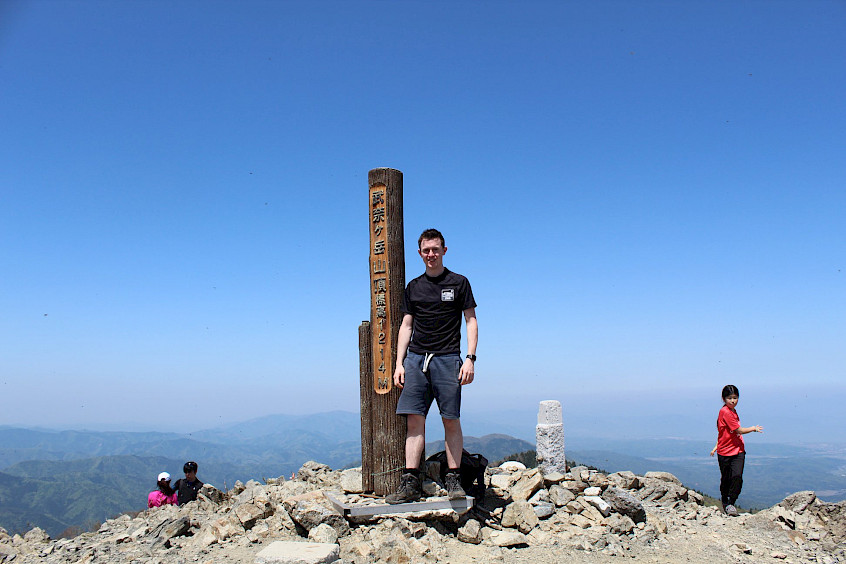
After JET, how did your career progress?
It was very challenging, to be honest. I returned just before the dawn of COVID. JETs coming back now will still feel the effects of COVID they'll still feel the effects of the economic situation going on in the UK and it is a real challange. So I returned in August 2019. I had a bit of savings, but I focused on applying for Jobs as often as possible.
I had a series of rejections which was very disheartening, and I think I was trying to highlight and focus on the things I had done in Japan, but I was really keen to get into the pharmaceutical industry.
I felt quite behind my peers who had graduated at the same time as me, they were all further ahead. I think a piece of advice for returning JETs is to not expect to be in the same place as your contemporaries; you're going to have to do a bit of catching up.
I eventually got a role at a company in Cambridgeshire. It was actually a graduate scheme, but it was a good entry-level opportunity for me. Since then, I've just been progressing as often as I can, trying to aim for the next thing on the career ladder. I've moved Jobs once, and I've moved companies once. In my new company I've just been promoted as well. I'm a project management team leader now. We work in a contract research organisation that support pharmaceutical companies in development of their new drugs. My company specifies in the analysis of the drugs themselves. We analyse them with 3 or 4 different techniques to check that they are the right structure or the right purity and check that they're safe to progress through to clinical trials to release into markets.
Has your JET experience helped you in your current role at all?
Tangibly it is quite difficult to explain how. I've got that international perspective that a lot of people can't say they've had. I've experienced life as a minority, for people in my position, that's quite uncommon, because I'm white British and I've grown up in a white British environment. I've never really been the minority until I was in Morayama, where I was the only white person in the city and for miles and miles around.
In my last company, at my last Job, it was a bit more tangible because we worked a lot with Japanese clients. I could actually use a bit of Japanese and use my understanding of Japanese culture. Sadly in this job we dont really work with any Japanese clients.
I think that whole experience is a benefit. It's a kind of transferable skill that you can take anywhere. We've all got teaching experience when we move away from our Jobs as ALTs. I do mentoring and training in my job.
How do you keep in touch with Japanese culture now you're back in the UK?
This is something I'm focusing on more and more because I really do miss Japan. I would love to go back to travel next year, and I don't do Karate anymore, sadly, but during in lockdown, everything went to zoom and things, and I kind of fell out of love with it a bit. I certainly have not fallen out of love with Japan in general. There is quite a nice club of people in the northwest who are interested in Japanese culture. There is a Japanese language conversation group. I participate in that where I can, but I also Just stay in touch with what they're up to. As soon as you are integrated into that kind of community, you start to hear about things that are going on.







